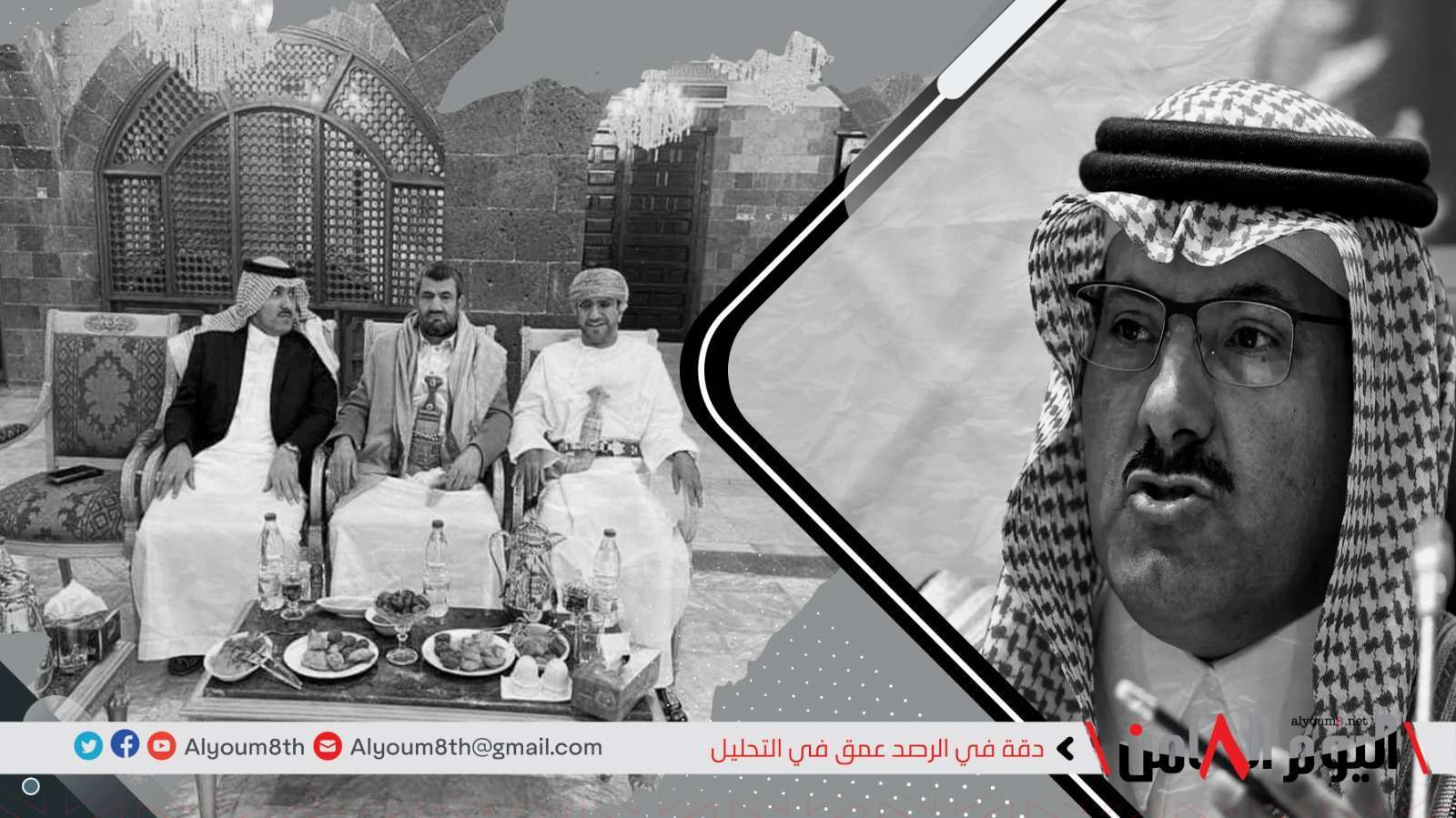Regional rapprochement in Yemen.
Iran... Schemes for applying different accounts to the management of the Yemeni crisis
Iran plans to apply different calculations to its management of the Yemeni crisis, which impose its ability to influence Houthi decision-makers, but this is also likely to encourage Houthi extremism at the negotiating table.

The Saudi ambassador to Yemen, Mohammed bin Saeed Al Jaber, visits Sana'a - Archive

Ahram Weakly English said that any settlement of the crisis in Yemen must be part of a broader regional solution, addressing issues related to the nature of the Yemeni state and government, and the issue of the south seeking independence from North Yemen under the control of Iranian proxies.
Ahram Weakly said in a report translated by Al-Youm Al-Eighth newspaper that "since the Yemeni crisis began eight years ago, it has been seen as a manifestation of a larger regional conflict, which means that any settlement of the crisis must be part of a regional solution."
Al-Ahram said in a report titled "Regional Rapprochement in Yemen" that any major breakthrough of this kind has presented itself with the Saudi-Iranian agreement through China to restore diplomatic relations between the two countries.
However, while the rapprochement between Riyadh and Tehran has continued to progress, the same cannot be said of the Oman-assisted rapprochement between Riyadh and Ansar Allah (Houthis) in Yemen.
Ahmed Eleiba, a writer at the English-language Al-Ahram Foundation, noted that efforts on this front have been deadlocked, despite the supposed relationship between Riyadh-Tehran and Riyadh-Houthis.
He stressed that Iran plans to apply different calculations to its management of the Yemeni crisis, which impose its ability to influence Houthi decision-makers, but this is also likely to encourage Houthi extremism at the negotiating table.
Bringing peace to Yemen would require action at many levels of conflict, he said. Regionally, the dynamic between Tehran and Riyadh is only one part of the regional rapprochement needed to resolve this and other conflicts, given the threat that Iran's policies pose to the region as a whole.
Domestically, the conflict involves multiple players in addition to the Houthis and Saudis. For the Houthis, however, the conflict is almost exclusively over their claim to power in Yemen's capital, Sana'a, because of their apparent victory and supposed right to dictate terms.
The Houthis see no need to engage the internationally recognized Yemeni government as a party to negotiate with or accept agreed terms of reference for the negotiation process.
But it is impossible for any Yemeni party to impose its wishes by force, and the Houthis do not have the ability to perpetuate their state within a state in the Yemeni areas they control, let alone seize more territory currently under the control of the recognized government, including those with energy resources such as Marib. Al-Jawf and Shabwa.
Meanwhile, the Aden-based Southern Transitional Council (STC) cannot unilaterally proceed with its secessionist project that seeks to revive the former South Yemen state as it was before unification in 1994.
The Yemeni conflict cannot be resolved by turning back the clock to before the Houthi coup in September 2014. None of the stakeholders supports the federal project formulated at the time of Yemen's national dialogue, and trying to push for a federal solution to the crisis will only exacerbate the crisis of the Yemeni state.
I begin with a series of observations about regional rapprochement in Yemen:
First, the notion that the Saudi-Houthi relationship holds the solution to the crisis in Yemen is incompatible with the complex nature of the crisis as a whole and the conflicting nature of the relationship. Conditions on the ground and the balance of power as they are now hold no hope for victory or defeat.
The Houthis have managed to hold on to the areas they control in (northern) Yemen, but this does not mean that the overall balance is in their favor. Not only have they failed to seize the oil-producing areas of Marib and Shabwa, but the joint forces of the recognized government, the Southern Transitional Council, and the western coastal brigades have succeeded in retaking many areas that were under Houthi control.
Second, the Houthis' insistence on parity with Riyadh defies logic. The Houthi movement is an Iranian proxy in the Yemen conflict and only part of Iran's regional proxy network. Now that Saudi Arabia and Iran have begun a regional settlement, logic dictates that the Houthis are seen as one of the stakeholders in the Yemeni conflict rather than the dominant player that can dictate to others. Third, Riyadh is supposed to know how it wants to rearrange the situation in Yemen in a way that is conducive to peace and stability. According to reports, the recognized Yemeni government disagrees with some of Riyadh's recent actions to promote its wishes.
Riyadh is also uncomfortable with some of the STC's recent actions and the strengthening of the Hadramawt Inclusive Conference, developments that do not seem to be consistent with its plans for Yemen in general and its management of the political forces that make up the Presidential Council of the Yemeni leadership.
Third, the Houthis will benefit from tensions between different groups and factions, not to mention the continued failure of different militias to unite under the umbrella of Yemen's armed forces.
Fourth, the future of the Saudi-led coalition supporting Yemen's legitimate government is unclear. Does Riyadh's initiative to make peace with the Houthis mean that the coalition no longer exists? If the Houthis decide to resume military activities against Saudi Arabia, will coalition members join them in the fighting?
While the coalition has been overseeing military operations since the conflict began, it was the Gulf Cooperation Council that oversaw the political process after the Yemeni revolution and the overthrow of former President Ali Abdullah Saleh.
The Gulf Cooperation Council (GCC) launched the so-called Gulf Initiative on Yemen in 2012, and most recently launched the initiative that resulted in the establishment of the Palestinian Legislative Council, which is incomplete given Iran's role as a major regional player.
The question may arise about the importance of the Iranian-Saudi rapprochement to the role of the GCC. Does this mean that it will now be possible to return to the Geneva process, this time engaging Tehran with Oman and Riyadh as mediators in negotiations to develop a new roadmap for Yemen?
Fifth, there are ways to pressure the Houthis to make significant concessions in negotiations. But Iran has little interest in pressuring the Houthis to that end, and perhaps instead of supporting the Houthis in the conflict, it will choose to help them capitalize on their gains at the negotiating table.
Sixth, any comprehensive settlement in Yemen must address issues related to the nature of the Yemeni state and government. Many overlap with concerns about the Houthi movement, not least the form of government, arms control and recourse, and the southern issue and its relationship to southern and northern Yemen.
Seventh, Yemen's recognized government remains relatively weak, despite improvements made by the GCC initiative. Tensions persist between the groups that make up the PLC, which also explains why the various military forces remain unable to unite under the umbrella of the government, all of which work in favor of the Houthis.
It would be impossible to launch a political settlement in the absence of a national consensus. The government may still see an opportunity to strengthen its position by improving conditions in liberated territories and reconstructing areas that suffered during the conflict. It might even consider putting forward a development model that contradicts that of the Houthi movement, which seeks to drag Yemen into the past.
Yemen does not yet appear to be on its way to a political settlement, even if there are moves in that direction. Instead, they go through a kind of rearrangement that may succeed in resolving some issues, while leaving others unaddressed or even exacerbated.



